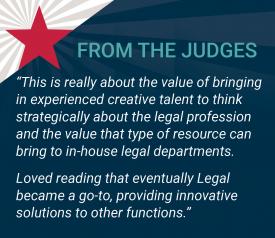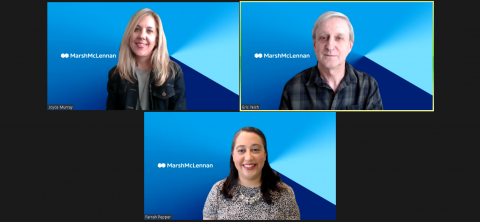In 2018, faced with legacy technology and changing times, General Counsel Peter Beshar committed to reimagining and modernizing the 600-person legal department at Marsh McLennan, a global professional services company. Bringing Farrah Pepper on board as the firm’s inaugural Chief Legal Innovation Counsel was the first step in a multi-year, multifaceted journey of experimentation and transformation. Pepper, whose work establishing a Discovery Center of Excellence at General Electric netted her an ACC Value Champion award in 2016, was given the freedom to design a new approach to legal technology and innovation. Adopting two experienced professionals from the Company’s internal technology group into the legal department, Pepper formed her small team and set out to design a new model for innovation and create a new definition of value.
“Value is not just about money,” Pepper says. “There are a lot of other ways to think about value. If you’re not thinking about all of them, you sometimes land on the wrong solution, because you have the wrong incentives. Yes, we can save time and money, but we also need to focus on improving quality, reducing risk, and increasing people’s happiness at work.”
With her teammates Eric Yeich and Joyce Murray, Pepper stood up the Legal Innovation Technology (LIT) Lab, an engine to drive new ideas and better outcomes. “The lack of resources, budget, and bandwidth—really mundane issues—had gotten in the way of people’s creativity,” says Pepper. By going on a listening tour, Pepper identified key colleague pain points. Through a process of experimentation, the LIT Lab team devised multifaceted technology and process improvements to deliver significant value in four major categories: automation and standardization, advanced technology, alternative fee arrangements and rightsourcing, and business alignment.
Embracing the spirit of experimentation was essential to developing creative solutions, Pepper says. “We went into this with the mindset that we would not let our efforts be fettered by the fact that there might not be a budget or whether there would be adoption. We talked about what could be.”
The resulting improvements included:
- Comprehensive, automated legal hold solution that enabled the disposition of significant amounts of legacy data and dramatically reduced annual storage costs
- Centralized, standardized discovery lifecycle program with playbook and templates, eliminating reliance on outside counsel to directly manage more than 30 terabytes of data
- New matter intake process for data collection and processing via templates, portals, and SOPs that saves four to six hours per matter during the initial setup phase alone
- Artificial intelligence-driven contract review that reduces in-house attorney review time by more than half
- Advanced technology and workflows for data management, culling 65 percent of volume
- Global contracts rightsourcing to an India-based Center of Excellence that has reduced spend by 80 percent
- Bundled flat-fee billing arrangement for transactional services, saving 70 percent off legacy provider rates.
These were not all moonshots, Pepper says. For example, the LIT Lab introduced a simple, elegant crowdsourcing tool that allows quick pulse surveying. “Just the fact that we were asking for feedback and using it in our town halls, finding ways for people to engage knowing their views mattered, made a huge difference in morale,” she says. “They’re not all life-changing. But when you add them all together, the result is a new, creative environment.”
Finding early adopters to pilot and test solutions was key to widespread uptake. “If they’re a hit, people hear about them and the solutions sell themselves,” Pepper says. The LIT team identifies and works alongside other creative colleagues, such as a compliance team who designed a support chatbot that responds to key policy and procedure questions with 24/7 self-service, slashing turnaround times. The modernization initiative had equipped the Marsh McLennan legal department with the resiliency to thrive during those trying times. “Covid was a great accelerator. Everyone’s minds and hearts were open, and everyone was eager to move fast.” Pivoting almost immediately to fully remote work, 76 percent of the department reported operating at a level of efficiency that was the same or greater than pre-pandemic levels.
Going forward, Pepper and the LIT team have set their sights on diversity and inclusion. Marsh McLennan’s Legal team is a core member of a private beta testing program with a leading software provider to enable tracking, selection, and evaluation of outside counsel based on diversity and inclusion data and metrics.
The work of the team is well appreciated within the company.
“Our LIT Lab has created tangible value for colleagues by using advanced analytics and AI to expedite reviews and reduce manual effort in our contract and discovery reviews, building bots to automate data preservation and influencing the design of a new outside counsel selection tool that will track inclusion and diversity efforts,” says General Counsel Peter Beshar. “Beyond the efficiencies generated by these innovations, the LIT team’s emphasis on inclusion and colleague engagement has helped create a more fulfilling, and even joyful, environment for all.”

